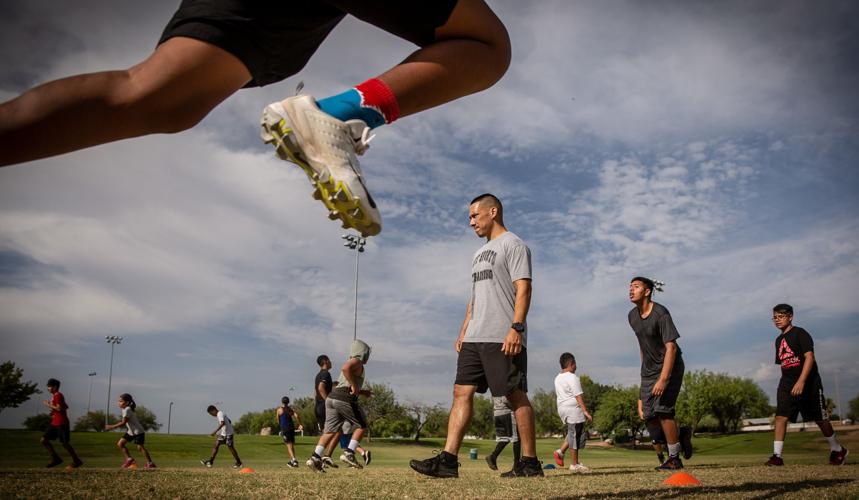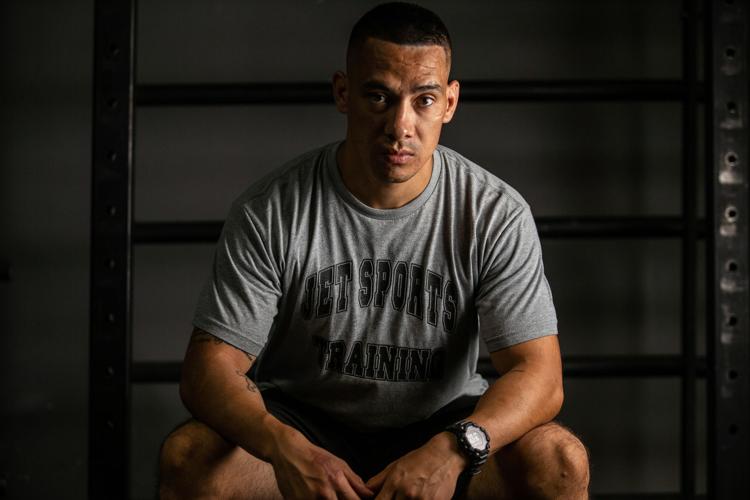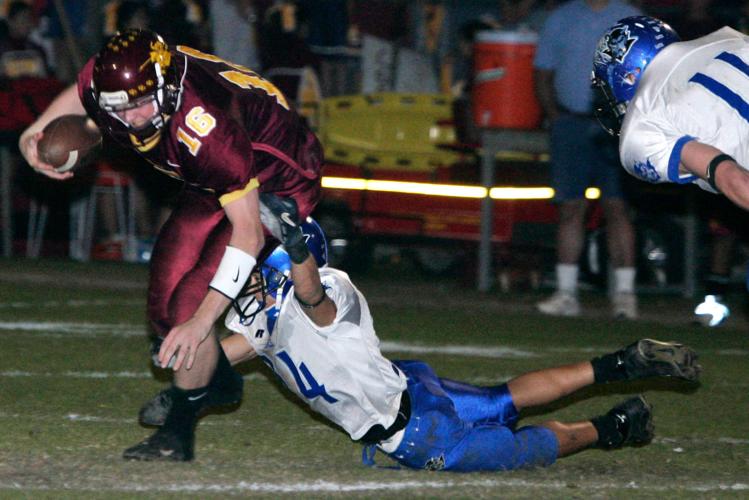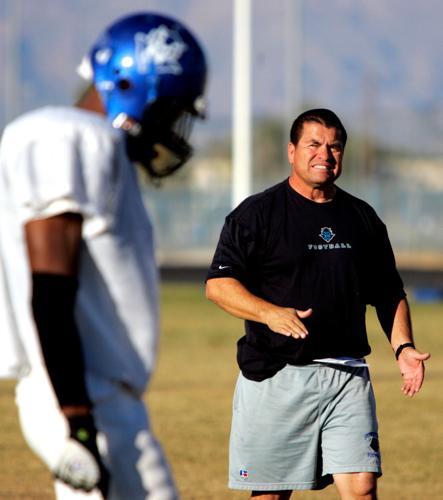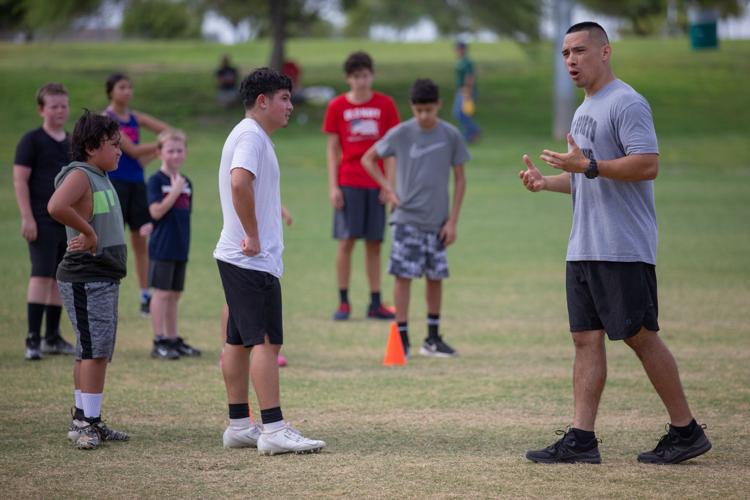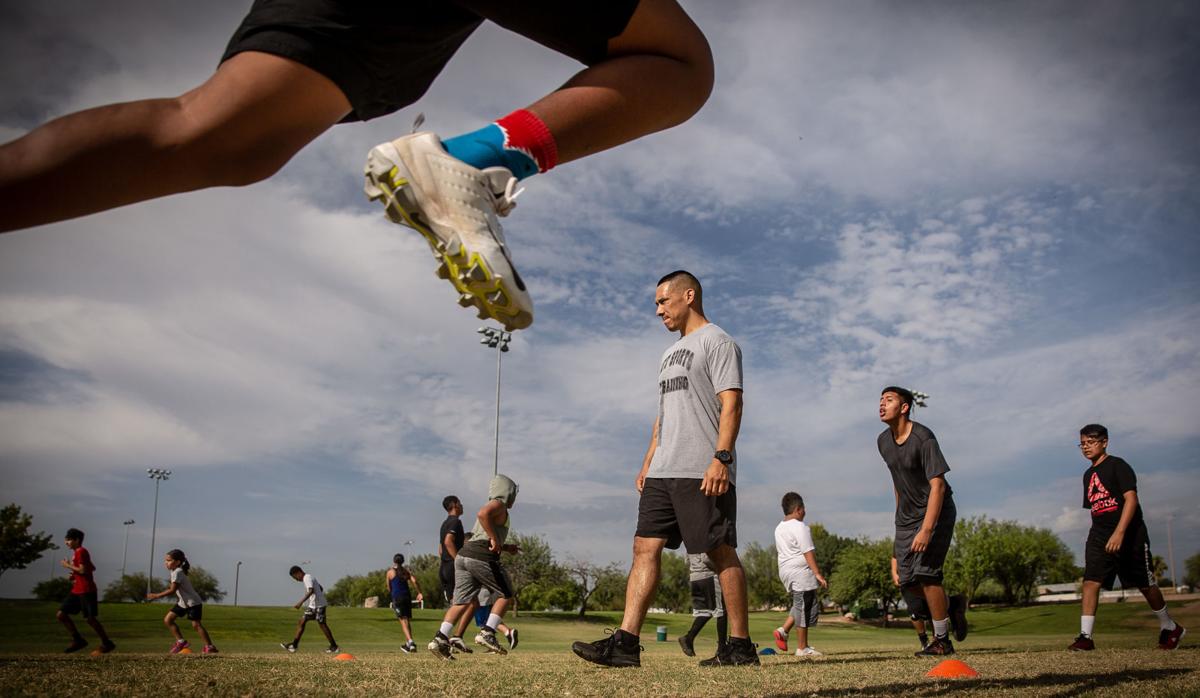If it weren’t for his grandmother, former Sunnyside High School football coach Richard Sanchez and a prison guard named Art Olivas, Bobby Rodriguez’s life could have turned out very differently.
From the age of 3 until he was a freshman in high school, Rodriguez lived with his grandmother in a house near the Tucson Rodeo Grounds, off South Sixth Avenue.
“We dealt with a lot of stuff just on our street,” Rodriguez said. “Drunk people wandering into our yard and things like that.”
Rodriguez, 31, said his grandmother, who died Thursday after contracting COVID-19, laid the foundation of respect and persistence that’s taken him everywhere in life: From the football fields of Sunnyside and the UA to the beaches of Brazil and back to Tucson, where he runs a training facility for local athletes.
Throughout the on-and-off closures of his gym, Rodriguez has improvised in order to continue training, proving to be a bright light for many local athletes during a precarious time.
Uncertainty is nothing new for Rodriguez, who was taken in by his grandmother, Natalia Armijo, when his parents split up. His mother took his sister and his father joined the work force.
“My grandma stepped up and raised me,” Rodriguez said, that his grandmother was a tough woman who “cut no BS.”
Rodriguez and his grandmother “never had a car; (we) rode the city bus everywhere,” he said. “She showed me how grow up fast and be independent.”
Rodriguez’s life wasn’t easy. And, he admits, things could have turned out differently had he not met a series of mentors who set him on the right course.

Bobby Rodriguez, owner of Jet Sports Training, is supporting Tucson wrestling legend Roman Bravo-Young in Paris as his trainer and coach. Bravo-Young is competing in his first Olympic games in 2024.
Intro to fitness: river runs, pumping iron at a prison
Rodriguez was a seventh-grader when a friend and his father asked him to join their football team. Rodriguez said no, telling them the sport was too expensive for his family. Besides, he said, he was already playing baseball and wrestling.
Rodriguez’s friend and his father, Art Olivas, wouldn’t take no for an answer. Olivas offered to train Rodriguez alongside his own son. Three days a week, Olivas and the boys would run in the sand of the Santa Cruz River bed, then drive to the state prison off Wilmot Road, where Olivas worked as a corrections officer. There, the trio would lift in the officers’ weight room.
“The vibe was always a little different, but it kind of set the tone,” Rodriguez said of the prison training sessions. “(Olivas’) own son wouldn’t even go sometimes, but he’d come pick me up anyways.”
Rodriguez learned bench pressing and squats, then moved on to more comprehensive training. It wasn’t long before he started overpowering kids his own weight in wrestling matches.
Football, he said, started looking better.

Sunnyside’s Bobby Rodriguez takes down Salpointe quarterback Max Fritz during the Class 5A regional championship in 2005. Rodriguez walked on at the UA, but quickly discovered that pro football wasn’t in the cards.
Coach instilled ‘attitude of consistency and hard work’Rodriguez continued wrestling through middle school. He also gave up basketball and started playing football, inspired by the success of Sunnyside, a powerhouse program in the 1990s and early 2000s.
“Sunnyside was the dynasty of football. They were on the rise and I wanted to be attached to that,” Rodriguez said, adding that his goal was to help the team win a state title. “It was just a full-time job. I knew I had to commit myself and be part of those teams and contribute to those teams.”
It was at Sunnyside that Rodriguez earned his nickname, “The Jet,” due to his speed on the football field.
His hard work paid off, and the Blue Devils won a state championship in 2003 and made the state final three years later.
Rodriguez’s relationship with Sanchez, Sunnyside’s legendary coach, was more important that any title.

Sunnyside High School head football coach Richard Sanchez during a practice on November 1, 2006 in Tucson, before Sunnyside (7-2) faced undefeated Salpointe (9-0) for the 5A Southern Region championship.
Sanchez saw something special in Rodriguez right away, taking the 5-foot-7-inch strong safety under his wing. Sanchez picked Rodriguez up for school in the morning and dropped him off at home every evening.
“He was the first person I saw in the morning and the last person I saw at night,” Rodriguez said of his coach. “He instilled an attitude of consistency and hard work, and taught me that good things happen from that.”
Sanchez told Rodriguez to take care of things in the classroom and handle himself like a business. Rodriguez took the advice to heart, spending one year at Pima College before enrolling at the UA. He walked on to the football team.
And now, nearly 20 years after he first started training with Olivas, Rodriguez is passing down the lessons that he learned to boys who aren’t that different from him.
‘I knew I could help people through training’
Rodriguez owns Jet Sports Training on Tucson’s south side. At Jet, Rodriguez and his coaches create workouts tailored for their clients’ specific sports. He’s trained hundreds of Tucson athletes in the three years that Jet has had a brick-and-mortar location.
The idea for Jet was born on the beaches of Brazil, where Rodriguez moved after graduating from the UA in 2012.
Football was no longer in his plans.
“When I got to college, I knew I was good,” Rodriguez said. “I’m fast, but I’m also only 5’7”. I knew this is where it ended for me.”
Former UA defensive coordinator Mark Stoops stayed in Rodriguez’s ear a lot, telling him that God didn’t bless him with size and to make sure he graduated with his degree. While Rodriguez appreciated his coach’s advice, he didn’t need it: He already had other plans.
“I knew I could help people through training. In high school, I would help teammates. I was good at pushing people to do more,” Rodriguez said. “In college, I would work out some people on the UA mall for no charge, just kind of messing around of it little by little. But I knew I could do it one day for real.”
Rodriguez moved to Brazil, where he lived with an aunt. He began to study Brazilian jiujitsu and Mixed Martial Arts.

Bobby Rodriquez, owner and trainer at Jet Sports Training, talks with young athletes during a summer strength and conditioning program lead at Silverlake Park, on July 10, 2020. With COVID-19 shutting down indoor training opportunities that summer, Rodriguez took the show outside, working with local youths outdoors at community parks.
Rodriguez often visited a nearby beach that had benches and pull-up bars. He began bringing his own cones and running drills.
“People noticed and they wanted to jump in,” he said. “At first it was two people and then at the end it was 20.”
Rodriguez’s aunt told him that he may have found his calling. He returned to the U.S. in 2016, and started training kids in the park.
“One kid turned into three, three into 10, 10 into 30, and so on,” he said.
Rodriguez started a women’s boot camp, and the next year, decided it was time to get a more permanent spot.
‘You’ve got to be a human’
In the middle of everything else, Rodriguez also found time for a new passion: bullriding.
Rodriguez got on his first bull in 2014, in Brazil. When he returned to Tucson, Rodriguez started participating in amateur rodeos, and in 2017, got the call to join the Professional Bull Riders Association. Since then, he’s competed in the United States, Mexico and Brazil.
Rodriguez’s newfound career was going strong until August, when he tore his meniscus. His recovery has been marked by significant highs (the birth of his son, Pierre) and lows (the coronavirus pandemic).
For the first five months, Rodriguez was in a full leg brace, unable to bend his knee or put weight on his left leg. Rodriguez began sprinting last month. Throughout his recovery, he’s still been training Tucson’s athletes, adapting to local and state ordinances as they’ve been handed down.
While his training facility is currently closed, Rodriguez is training young athletes in the park several mornings a week at a reduced cost. Rodriguez is letting his fellow coaches work rent-free at the facility when it’s open.
“At the end of the day, you’ve got to be a human,” Rodriguez said, adding that he’s grateful for Jet’s team of coaches.
Rodriguez says his family will be fine without his rodeo income, as he and his wife live on a working ranch on Tucson’s southwest side. He also owns a grading and hauling business, and its busy season is right around the corner.
“It’s something we can look back to in a few years and wonder how we survived that as a business,” Rodriguez said of Jet and its remaining coaches.
As for his favorite coach?
Sanchez served as the best man in Rodriguez’s wedding several years ago. The two talk at least once a week, with the topics ranging from sports to current events.
“I have so many people to credit. I was raised by a village, so that’s why I am the way I am today,” Rodriguez said.
“A lot of things I tell the kids is just a replica of what my coaches taught me.”


